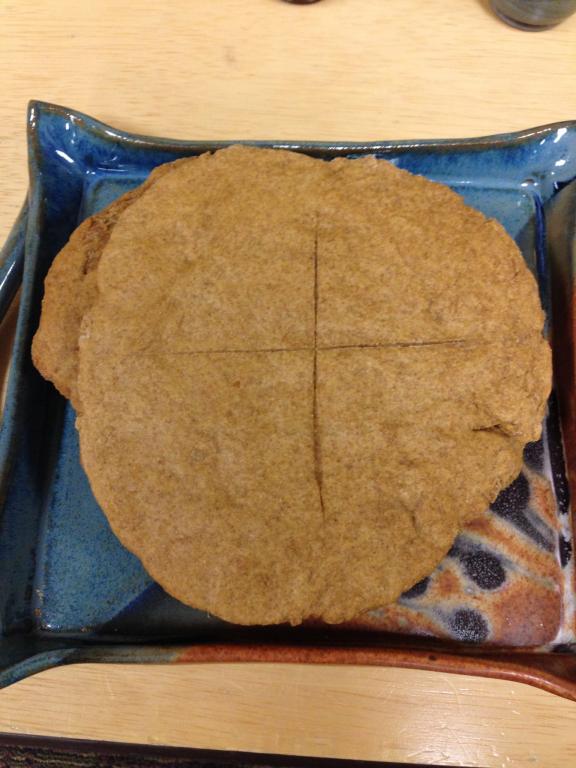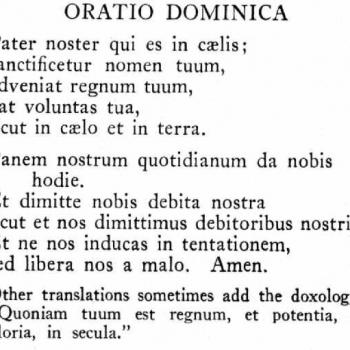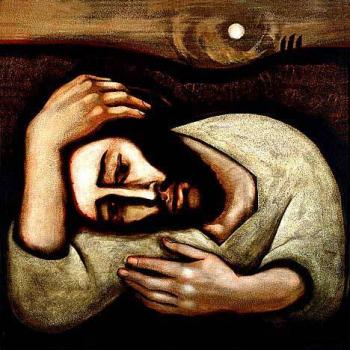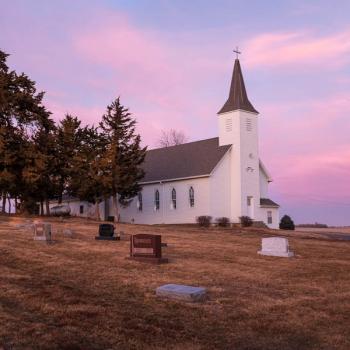Give us our daily bread.
We have prayed both for and against ourselves in the early petitions. We have prayed for the Father’s kingdom against our own. We have prayed for the Father’s will, however much I might prefer my own. It is his kingdom, his will, and we have prayed that it will come and be done so we may know him as our Father. We have prayed against our own will, our own kingdom.
We must do this because the human inclination is to reject God and Christ, his Word. We’d rather go our own merry way even if it ends in oblivion. These are petitions asking God to put our sins to death that he might thereby, so Psalm 51 pleads, “create in me a clean heart.”
Clean hearts is God’s work. We’re not up to it. “Prone to wander, Lord, I feel it,” says Robert Robinson’s old hymn, “prone to leave the God I love.”
St. Augustine puts it, it is God who must make us obedient that we will greet his kingdom and happily seek his will. To do this he gives us his Word, the sacraments of the Church, our companions in faith. Through these the Holy Spirit works upon us to soften our hearts and train our minds, to summon us back from our wanderings.
Here’s the thing, no mistake: Every petition so far has been as much contra nos as it has been pro nobis.

We now come to the petitions from the resurrection side of baptism, praying “Give us our daily bread.” As bread goes, Psalm 145 says we’re already covered. “The eyes of all look hopefully to you; you give them their food in due season.”
If God does that, why do we ask? It is so we will know it is God’s bread and give thanks for it.
Oops. Here again we bump into fallen Adam, fallen Eve. They turn up their noses at God’s bread. “Why do I have to thank anybody for what I earn from my own work? It’s my bread. If I didn’t work for it, I wouldn’t get to eat it.”
Ah, stop. Remember, we are a new people washed in the waters of God’s love. By now, having prayed the previous petitions, we ought to know that life is more than our own triumphs and more than our own bellies.
Recognizing the gifts of God that imbue daily life, we begin to see his abundance in the small and defining things we encounter daily. It’s more than bread, you know. Bread is a summary, and as we sink our teeth deeper into the joys of life, God tenderizes our hearts.
The world is fallen into sin. Creation, in a word used by Paul J. Griffiths, is the world “devastated,” a charnel house of blood and violence. That is the effect of sin.
Yet God gives visions. We still catch the flickering traces of creation’s dramatic beauty and surprising kindnesses. These forecast our Father’s final creative goal. These hints, these sparkles that dazzle so, are providential visitations with an ultimate hope of Eden restored.
Raised in baptism to the life of Christ we see with new eyes the ennobling gifts that bless human living. “Bread,” like I said, means more than bread. To pray this is to give thanks for all needful things, including the gift of human ingenuity ― with all of its promise and threat ― in the co-creative task God has given to us.
Co-creative? In Genesis (2:18-20) – I love this story – God gives to humanity the chore of naming the animals, naming all things in creation. The force of the text indicates God would not know their names until spoken by the man. I am deeply fascinated by this. In my somewhat whimsical view of scripture, I imagine a conversation, God and humanity:
God: Okay. What’s this?
Man: A platypus.
God: Say what?
Man: You said I could name it.
God: Alright, a platypus. But remember, you have to take care of it.
We name the things of creation and become co-creators with the Father, and assume responsibility for the gifts the Father as given for our conscientious use. Like the writer of Psalm 90, we beg God to “prosper the work of our hands” when we beg for his bread.
We seek in creation everything that “bread” is: family, good government, faithful leaders in society and Church, peace, health, decency, honor, and enduring companionship.
We have also raised a plea for those who lack this day’s bread. To ask for God’s bread evokes our accountability to our neighbors, “in solidarity with their needs and sufferings.”
We finally ask also for the bread of life that is God’s Word. This petition relentlessly links us to the Eucharist, to the coming feast day of the kingdom consummated. As we pray for and know the joy of the bonds of kinship in our family suppers, so here we pray for a promised kinship transcending time and eternity.
Russell E. Saltzman lives in Kansas City, Missouri. His latest book is Speaking of the Dead. He can be reached at [email protected]and on Twitter @RESaltzman.












